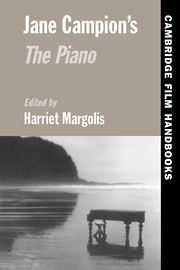Book contents
3 - The Piano, the Animus, and Colonial Experience
Published online by Cambridge University Press: 16 January 2010
Summary
The structure of The Piano obliges the spectator to recognize that closed interpretations based mainly on analysis of its characters and the narrative are unreliable. The film can be anchored neither to straightforward readings based on its main character's story world, nor to the historical world of mid-Victorian colonialism – which is not to deny that both are presented with clarity. The film's themes are diffuse because its obvious symbolic riches coexist with a lack of hard information about the principal character. Neither the events of the plot nor the heroine's inner narration let us into the secrets of her past.
For this reason, interpretation of The Piano has to be augmented by other means. This essay offers a reading based on the idea that the film allows us to see not only the exterior but also the psyche of the main character, revealing in a single sweep how her social milieu touches her interior world. On the one hand, this essay offers an analysis of the main character in accordance with Jungian principles. On the other, it seeks explanations for the changes that she brings about in her life beyond the context of simple personal development. To this end it considers the psychological dimension of relationships between the characters in the context of their colonial setting.
Ada (Holly Hunter) has refused to speak since she was six years old, but we never find out why.
- Type
- Chapter
- Information
- Jane Campion's The Piano , pp. 86 - 113Publisher: Cambridge University PressPrint publication year: 1999



